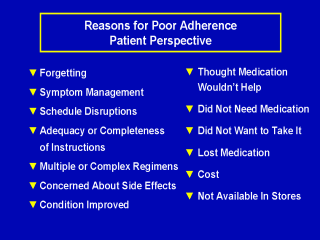 |
A cluster of reasons contribute to a patientís difficulty
in adhering throughout the treatment. The primary reason is forgetting. (That's not the
primary reason for not following dietary or exercise regimens.) Howard Leventhal,
currently at Rutgers, is developing a model based on his work with hypertension patients
that looks at what patients believe about the symptoms of their condition and the nature
of the condition that they have, whether patients believe that it's a short-term disorder
or a long-term chronic disorder. He finds that what patients believe about their symptoms
and their duration influences how they manage their medication treatment and the other
components of treatment that have been recommended. Those who believe that a symptom of
high blood pressure is a headache tend to be episodic in their management of their
condition; they follow treatment when they're having headaches, and they don't follow
treatment when they're not. Patients who believe that they have an asymptomatic and
chronic condition are more likely to be persistent with their health care regimen. We're
finding in some of our work that schedule disruptions are a major reason for individuals
to be poorly adhering, particularly to medications and possibly with exercise regimens as
well. The intention is to follow the exercise regimen, but then life gets in the way and
that event is missed. To the extent that the individual's life is somewhat chaotic and
disruptive their adherence will be sufficiently lower. We also know that adequacy or
completeness of instructions is problematic for individual patients when they're assigned
to follow treatment regiments, which we've learned from interactions with patients. It's
not unusual for a patient to be told to take a medication twice a day.What that means is
not typically given to that patient either by the health care provider, by the pharmacist,
or by whoever else is contributing to the patient's education. If you take the case of
older adults, who may be retired and have a sleep and awake schedule that allows them to
sleep late in the morning and retire early in the evenings, it's not unusual to find that
twice a day medication is taken at 11 o'clock in the morning and again at 2 or 3 o'clock
in the afternoon. From their perspective, they have done exactly what they were told to
do. But with many of those medications effects will wear off, so for a portion of their
day they're either not deriving therapeutic benefits or they're actually over-medicating.
Multiple complex regimens are more difficult to follow than having simple regimens,
although researchers who are looking at pharmacokinetics and its impact on treatment are
telling us that sometimes the simple regimens are the ones where we can get into some of
the more problematic clinical problems. Missing a medication that only needs to be taken
once a day or 2 or 3 times a week has a bigger impact than having missed an event when the
person is taking medicine 3 times a day. The risk of missed doses is greater when
treatment is more complex but we're not sure that the risk of critical outcome is going to
be greater. |
